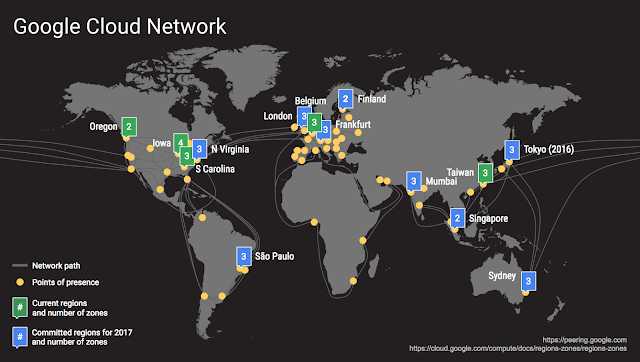Google is putting a new umbrella name on its enterprise portfolio, now dubbed Google Cloud, and expanding the number of cities in which it has data centres for offering its services for running enterprise applications. Unfortunately, none of them are in Canada.
The company said Thursday there will be eight new Google Cloud Regions — Mumbai, Singapore, Sydney, Northern Virginia, São Paulo, London, Finland and Frankfurt– next year. However, more will be added next year.
Google Cloud includes all of the company’s productivity G Suite (the new name for Google Apps for Work, including Gmail), machine learning tools and APIs and the enterprise maps APIs. It also includes Kubernetes, an open source container management system the company developed.
“Not only do applications running on GCP benefit from state-of-the-art infrastructure, but they also run on the latest and greatest compute platforms,” Brian Stevens, vice-president of Google Cloud, said in a blog.

Speaking of Kubernetes, it has been updated to version 1.4, with the Google Container Engine (GKE) adapted to the new version. GKE customers now have the ability to monitor cluster add-ons, one-click cluster spin-up, improved security, integration with Cluster Federation and support for the new Google Container-VM image (GCI).
Kubernetes 1.4 improves Cluster Federation to support straightforward deployment across multiple clusters and multiple clouds, the company says. GKE customers will be able to build applications that can easily span multiple clouds, whether they are on-prem, on a different public cloud vendor, or a hybrid of both.
Google also said it is updating its data analytics and machine learning offerings. Google BigQuery, a fully managed data warehouse, now supports Standard SQL , and new features have been added that improve compatibility with more data tools. There also integratation with Identity and Access Management (IAM) that allows businesses to fine-tune their security policies. Finally, to make it accessible for any business to use BigQuery, there’s now unlimited flat-rate pricing that pairs unlimited queries with predictable data storage costs.
In addition, Cloud Machine Learning is now available to all businesses. Integrated with other Google data analytics and storage cloud services the company says it helps enable businesses to easily train quality machine learning models on their own data at a faster rate. Dedicated educational and certification programs to help more customers learn about the benefits of machine learning for their organization and give them the tools to put it into use are also now available.
